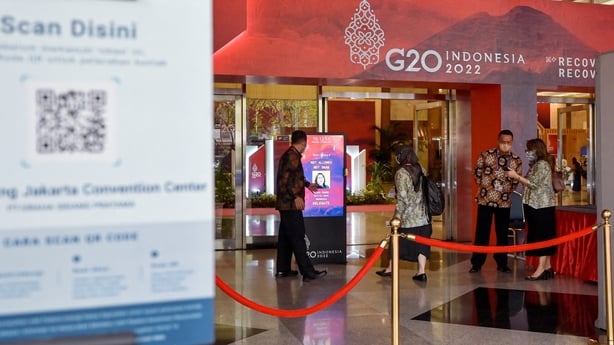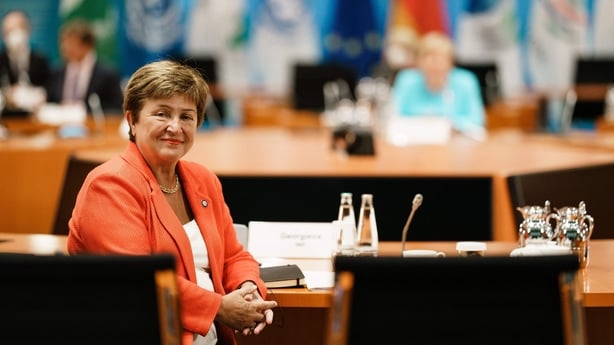Finance ministers and central bank governors of G20 nations began a two-day meeting today with Indonesia's leader warning the Ukraine crisis was a threat to the post-pandemic recovery.
The Group of 20 brings together the world's biggest economies including the US, China and some European nations.
It is holding the talks in hybrid format in the Indonesian capital Jakarta.
Opening the meeting, Indonesian President Joko Widodo warned of the risks to the global economy of the crisis in Ukraine, where fears are growing that Russia is poised to invade.
"This is not the time for rivalries and creating new tensions that disrupt the... recovery, let alone endanger the safety of the world, as is happening in Ukraine," he said.
"All parties must stop the rivalry and tension," he added.
The threat of a Russian invasion of its ex-Soviet neighbour presents a fresh challenge for a world already struggling to keep a recovery from the coronavirus pandemic on track as inflation surges.
Ahead of the talks, US Treasury Secretary Janet Yellen warned in an interview with AFP of further "global fallout" if the West moves ahead with punishing sanctions on Russia over the crisis.
Rocketing global inflation will also be in focus at the meeting, as central banks begin tightening rates and withdrawing massive stimulus introduced during the pandemic.
Other issues on the agenda at the talks - which were originally due to take place in Bali but were moved due to an Omicron virus wave - include debt restructuring for poor countries and reform of global health systems.

Meanwhile, wealthy nations must improve their floundering flagship debt relief initiative or face a spate of debt crises in the developing world, experts and campaigners say as today's G20 meeting opens.
As the pandemic battered global economies, the Group of 20 leading economies launched measures, including a temporary debt service suspension for poor countries to provide breathing room, as well as the Common Framework - a debt restructuring scheme for long-term relief.
The Debt Service Suspension Initiative (DSSI) has now expired. Meanwhile, having signed up for the Common Framework a year ago, Zambia, Ethiopia and Chad have yet to receive relief.
Their uncertain fate, coupled with the fear of being punished by the market, have led other governments to steer clear of the Common Framework.
"It doesn't give them any incentives," the Washington-based Center for Global Development's Daouda Sembene, a former director at the International Monetary Fund (IMF), told Reuters.
"Unfortunately, it so far has done some harm and not necessarily good."
Alarm bells are ringing for many. According to the IMF, some 60% of low-income countries - mostly in Africa - are either in debt distress or at high risk of it, up from less than 30% in 2015.
This year, 74 low-income nations must repay $35 billion to bilateral and private lenders - nearly double from 2020, the World Bank calculated.
With the US Federal Reserve on the verge of hiking interest rates, borrowing costs are set to increase for riskier emerging markets.
US Treasury Secretary Janet Yellen has called for action on relief for poorer nations and will urge her G20 counterparts to work towards shoring up developing countries.
World Bank President David Malpass said last month the slow pace of relief is increasing the risk of sovereign defaults.
Hung Tran, a former IMF deputy director now with the Atlantic Council think tank, wrote this week that G20 initiatives to deal with debt had "largely failed".
"Unless these efforts are strengthened, sovereign debt crises will prevent vulnerable countries from fully bouncing back after the pandemic," he added.
Officials in Indonesia, which holds this year's G20 presidency, say debt relief is one issue on the agenda at the meeting of finance ministers today and tomorrow.
IMF chief Kristalina Georgieva wants the Common Framework beefed up with timelines to speed up decision-making and clear comparability of treatment enforcement, providing creditors comfort that the process is fair.

She also wants debt service standstills during restructuring negotiations and an expansion of the framework's remit as many countries holding the bulk of at-risk debt are not poor enough to currently qualify for relief.
Others are pushing for deeper revisions.
The Atlantic Council's Tran believes debt service standstill should prevent ratings agencies from downgrading countries seeking relief.
Tim Jones of the UK-based Jubilee Debt Campaign says a plan is needed to deal with private creditors and bondholders, who refused to participate in the now expired DSSI initiative.
"You need to make clear the alternative is them not being paid anything," he said
What action, if any, the G20 delivers this week remains to be seen.
Finance ministers might be absorbed by issues closer to home - geopolitical tensions, rising global inflation and tighter monetary policy.
"So what happens in 30 low-income countries, even though it's 30 countries, is something that could be happening on another planet," World Bank Chief Economist Carmen Reinhart told Reuters.
Even a functioning Common Framework will solve only half the problem, experts say. Countries must get help in growing economies, not just traditional austerity measures.
"It is not solving a growth problem, and you cannot solve a debt problem by killing growth," said Vera Songwe, the executive secretary of the UN Economic Commission for Africa.

